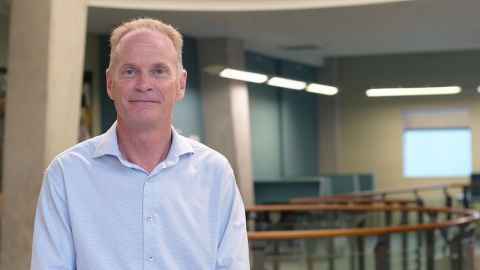Mark Barrow: Biggest challenges facing educators
06 June 2019
Opinion: Dean of Education and Social Work, Mark Barrow, lays out his key concerns about teacher education in New Zealand.

Attracting people into the profession
Perhaps the single biggest challenge we face as a profession is attracting sufficient people interested in preparing to be teachers. According to the Ministry of Education’s Teaching Counts data, between 2011 and 2016 there was a 45 percent decline in the number of people entering Initial Teacher Education programmes across New Zealand (a 58 percent drop in ECE students, a 37 percent drop in primary students and a 41 percent drop in secondary students). Between 2017 and 2018, there was a small increase, but this was off the low base of 2016.
Over the same period (i.e. since 2010), there has been a 37 percent drop in the number of new teachers entering ECE centres and schools (made up of a 47 percent drop in ECE, and 30 percent each in primary and secondary schools).
Not only does this mean that schools miss out on the vitality and recently acquired knowledge and skills of new teachers, it also exacerbates the issues of an ageing workforce and the teacher shortage.
Lack of an interconnected teacher preparation system
Universities and other tertiary providers are only one part of the teacher preparation system. Graduates attain provisional registration on leaving the university.
They will remain ‘teachers in training’ for a further two years, after which they can apply for full registration as a teacher. For two years of their preparation, ‘teachers in preparation’ must draw on the expertise of mentors within centres and schools.
Up until now, conversations about this have fallen into the spaces between discussions among a variety of players, such as the teacher unions, the Teaching Council, and the Government’s Workforce Strategy Group.
However, there is no joined-up thinking, and universities have not been in the conversation. An example of a missed opportunity is the newly approved Code of Professional Responsibility and Standards for the Teaching Profession.
The code rightly focuses the attention of teachers on the needs of learners. During its development, we might have considered what role registered teachers should play in inducting new members of the profession, such as acting as preceptors to their provisionally registered colleagues.
While teacher education providers strive to ensure that their graduates are very well prepared, no provider can claim (nor should they want to) that a new graduate will be able to deal with every situation he or she faces in a centre or school. The two-year provisional registration period recognises this.
We need far better collaboration between the Teaching Council, universities (as the major providers of teaching graduates) and schools and centres to ensure that provisionally registered teachers get the development opportunities they need in order to thrive as teachers.
The right preparation
Teacher education providers and mentors in schools and centres need to work together to ensure the right preparation for graduation and registration. Teaching is complex. It is an intellectual endeavour as well as being practical and technical. The two facets cannot be divorced from each other, though there is a tendency in current rhetoric surrounding teacher preparation to suggest they can be.
Together we want to produce teachers who can work skilfully in the New Zealand context with the range of learners they will encounter, to have high expectations of all learners, and to teach people who are different to themselves without bias.
Valuing teachers
Teachers do not feel respected. The teachers’ strike of 29 May illustrates the lack of value that policymakers place on teachers. By the standards of their similarly qualified professional peers, teachers are modestly paid. The fact that most teachers (having reached the top of their pay scale) will not have had a pay increase for approximately ten years is an indictment of politicians of all stripes.
At the same time, policymakers have imposed accountability regimes and reporting systems on teachers that, in total, tell members of the profession “we are watching you”, “we do not trust you”.
Teachers should expect scrutiny, but any scrutiny should be with the intention of improving the operation of the system in which teachers work, rather than being an imposition on individuals. Until we address issues like these, we will struggle with the first issue I raised – attracting people to the profession.
Associate Professor Mark Barrow was one of five panellists who took part in the successful Education Central Chalk Talks event, Reimagining Teacher Education, hosted by the Faculty of Education and Social Work at Epsom Campus on 5 June.
This article reflects the opinion of the author and not necessarily the views of the University of Auckland.
Used with permission from Education Central: Attracting people to the profession, published on 30 May 2019.